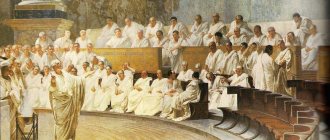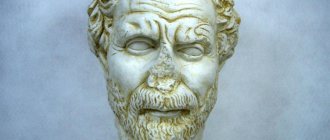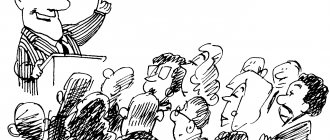“Man is superior to animals due to his ability to speak; but he sinks below an animal if he does not use it properly.” Saadi
The term “rhetoric” (as, indeed, the art of eloquence itself, and the science of this art) was born in Ancient Greece. Literally, “rhetoric” is translated as “oratory”, “the ability to make a speech.” To what area can we classify rhetoric? To the sciences, to the arts? Or does it combine the properties of both? Let's try to figure it out.
What if...
Let's start with an argument: why in our time does it seem to many that almost no one needs the ability to competently, beautifully and clearly express their thoughts, communicate with an audience, and convince listeners?
We partly answered this question a little higher: modern means of communication do part of the work for us. Alas, communication sometimes comes down to exchanging short messages - or even emoticons.
Allegory of rhetoric (XVI century). Engraving by Etienne Delon
But in ancient times, during the Middle Ages (whatever, even some fifty years ago!) the absence of electronic means of communication and various messengers required the ability to speak in public, clearly formulate one’s views, and present them competently. It’s not just that, through centuries and even millennia, samples of speeches that were once made by politicians, generals, and religious leaders have reached us...
One can endlessly wonder whether Julius Caesar would have become the ruler of the Roman Empire if he had not been able to find a common language with both high-born members of the Senate and representatives of the plebeians? Would the Italian monk Girolamo Savonarola have been able to practically lead the entire spiritual life of Florence and reform church life for many years, if not for his brilliant oratorical abilities? Who knows how the Battle of Poltava would have ended if Peter I had not found the right words to inspire the soldiers before the start of the battle? Examples can be given endlessly...
“Poetic creativity is a play of feeling, guided by reason; eloquence is the work of reason, enlivened by feeling” (Immanuel Kant)
Types of rhetoric
Currently, there is the following classification of rhetoric by type:
- socio-political (parliamentary and rally speeches, campaign speeches), which is characterized by emotionality, and often pathos, for persuasion and motivation to action;
- academic (scientific review, educational lecture), with arguments and facts, structured, sometimes monotonous and indifferent, as soon as the speaker loses touch with the audience, reading a prepared text;
- social and everyday (welcome, table, anniversary address, toast), for the most part simple and sincere, not distinguished by perfect logic and clear structure, but sincere and kind-hearted;
- judicial (accusatory, defensive), strictly reasoned and balanced, determining the fate of a person;
- theological-church (sermon, official church speech) uplifting spiritually, bringing joy, instructing for good;
- military (address-order, instructive, inspiring speech), specific, strict, strengthening patriotic feelings, nurturing love for the Fatherland;
- diplomatic (speech at international negotiations and conferences), characterized by a high degree of responsibility for every word spoken;
- business (business as well as telephone conversations), the obligatory elements of which are accessibility, expressiveness, and literacy;
- dialogical (interview, argument, discussion), which requires practicing the skills of proper dialogue.
More, even more information!
Of course, neither today nor five hundred years ago everyone was destined to become a commander or statesman. But the role of eloquence in the past was significantly higher than it is now. Why? It’s very simple: we, people of the 21st century, are fed up with information. We watch films, listen to news on the radio, read feeds from information sites. Every minute, gigabytes of photographs, articles, messages, and music tracks are dumped on us. Many of us encounter verbal communication only at a school desk or in a university lecture hall. In short, we can obtain a huge amount of information without resorting to face-to-face communication. At the same time, the quality of the text itself fades into the background - in many cases the text is replaced by a video, photograph, or infographic.
And a resident of a medieval city or Greek polis sometimes had no other opportunity to find out the latest news than to listen to an orator or herald. This man had no photographs or videos at his disposal; he could only rely on his eloquence. Let us remember that there were few literate people then, so even written sources of information could not always fully fulfill their functions.
“By reading authors who write well, you learn to speak well” (Voltaire)
Lawyers, teachers, religious figures, politicians learned to speak correctly and convincingly... By the way, it was in the political struggle that the ability to defend one’s point of view and attract like-minded people never lost relevance: for example, many researchers are convinced that during the Civil War in Russia, victory remained with “ “red”, not least thanks to competent, very visual and superbly organized campaigning.
“But excuse me,” you can say, “now is no longer the Middle Ages and, fortunately, not the times of the Civil War! Moreover, many politicians and public figures have long preferred not to speak from the podium, but to use the capabilities of the World Wide Web for propaganda!” This is partly true. But…
How to prepare for a performance?
To properly compose a speech, you need to adhere to the rules. Each rule is a section of rhetoric:
- Intention - directed to think in order to solve a problem.
- Disposition - to correctly distribute thought.
- Elocution is the linguistic design of prepared speech.
- Memoria is a feature of memorizing oratorical speech.
Before the speech, formulate hypotheses (thoughts of the speech). The greater the amount of thought and knowledge, the more inspiration will come. If the topic was able to hook the speaker, then it will hook the listeners.
Work on your speech before your speech. Think, look for information and arguments. In a few days you can create a serious base based on ideas and facts.
The mood of the audience depends on the time and place of the performance. In everyday life, a person takes information seriously, but in a large audience the topic will seem boring. It is necessary to create an environment that will remove those present at the performance from routine and direct thoughts and actions in a useful direction.
Speaking skills: Who needs it?
Despite the fact that we devote less and less time to personal communication, and we trust gadgets more and more, we can name many situations when eloquence skills are necessary.
The simplest example: you need to give a presentation to business partners. Yes, of course, sometimes no presentations are required and when concluding deals you can get by with an email. But you can probably remember a couple of situations when, for example, the need to publicly talk about your company or products caused an acute attack of panic among employees - for the simple reason that they were not confident in their rhetorical skills. Or when an insecure, boring, sluggish presentation by a company representative discouraged potential clients from doing business with her...
“Speech should flow and develop from knowledge of the subject. If the speaker has not studied it, then all eloquence is a vain, childish effort" (Cicero)
Surely, if you remember your student years, you will be able to name the names of teachers whose lectures you listened to with enthusiasm, and even notorious lazy ones. Simply because the professor or associate professor brilliantly mastered the art of words, “saw” the audience, and knew how to contact it (yes, this is a necessary skill, and we will definitely talk about it too!). And, unfortunately, they remain in the memory of many of us. no, not lectures, but memories of how during these lectures we painfully tried not to fall asleep and remember at least something. And at this time the lecturer, with his eyes downcast, muttered indistinctly, moved from the fifth to the tenth and with all his appearance expressed disgust at what was happening. Yes, many educational institutions already have video recordings of lectures in their arsenal, and it is not always necessary to attend a “live” lesson. But audio or video lectures can also be both successful and not so successful.
Guy Julius Caesar in his youth studied the art of eloquence, but, according to the testimony of many ancient historians, he did not complete the course of study. He decided that where he lacked rhetorical abilities, his legions would say everything for him. However, the literary heritage of the Roman ruler suggests that he was undoubtedly a talented speaker and writer
Perhaps you have come up with another argument: “But many have graduated long ago and, for example, are working remotely! Thanks to modern technologies, you can provide for yourself without leaving home at all! Why should I care about eloquence and the ability to properly structure the communication process?” Yes, but not so. Remember how many times you were indignant, for example, at the tongue-tied instructions for household appliances, how many times you couldn’t decide on a summer vacation destination because of a clumsily drawn up tour description, how many times you couldn’t get clear and logical instructions from your manager... But all this has a direct impact attitude to the art of rhetoric! After all, even if the text is not intended to be spoken publicly, no one has canceled the need to compose it competently and logically.
And in ordinary everyday communication, a person who can express his thoughts beautifully, captivatingly and clearly is much more pleasant than a gloomy type who is unable to connect two words. (We will still proceed from the fact that we do not spend our entire lives within four walls and from time to time “go out into the world.”) Even the ancient Greek sage Aristotle (by the way, who did a lot for the development of ancient rhetoric) said: “Man... is social animal." As long as human society exists on Earth, we will need communication skills. Honestly, this law has been true since the time of Aristotle!
Well, did we manage to convince you?
A matter of national importance
Peter I demanded from those close to him not only precision and clarity of reports, but also mastery of the subject. Just look at his decree of 1703: “I instruct the senators at assemblies and in the presence of gentlemen to speak only in words, and not in writing, so that everyone’s stupidity is visible to everyone!”
Development of rhetoric
How can one learn all the intricacies of this science? If you really want this, use our recommendations:
- Hone your diction. Speak slowly, pronouncing each word clearly, observe pauses and even breathing.
- Read aloud and retell what you read. Try to convey the meaning in your own words, constructing your speech yourself.
- Learn to tell the most ordinary stories that happen to you in a captivating way. Feedback from listeners will tell you how well you are doing.
- Prepare a speech on a topic close to you. Prepare key phrases for this and improvise as you pronounce it.
- Train your memory. Learn poems and excerpts from literary works by heart and let it become a habit.
- Determine your type of information perception. Some people learn visual information better, while others find it easier to remember what is said out loud. Use this knowledge about yourself to get the best results.
- Organize your studying with pauses and breaks in mind. Let it also be regular, and not just once in a while.
- If you have a fear of public speaking, practicing these very speeches helps a lot. Practice with your loved ones - they will understand and will definitely support you.
Beautiful Science, Complex Art
So what is rhetoric after all - an art or a science?
If we proceed from the fact that there are certain rules for constructing one’s speech, composing a speech, and working with an audience, then rhetoric must be recognized as a science. Of course, there are happy individuals who are born with the ability to behave in public and speak fluently, but even they have to hone and polish their natural abilities. The existence of rules, algorithms, certain laws and techniques of oratory forces us to attribute rhetoric to the field of scientific knowledge.
At the same time, many of you have probably listened to lecturers or presenters whose speech was accurate, competent, beautiful, but... as they say, not catchy. The speaker did not evoke a desire to listen to him, to enter into a dialogue with him, his words did not resonate either in the soul or in the mind. So, besides the rules, is something else needed? Is the ability to pronounce a speech not only the ability to put words into sentences? So, rhetoric can be viewed by analogy with painting, where in addition to the ability to handle brushes and paints, talent is also needed? And then rhetoric can be called an art, which, quite possibly, is not subject to everyone and requires a special personality?
Among the fathers of rhetoric, along with Corax, Demosthenes and Aristotle, is the ancient Greek philosopher, politician and healer of the 5th century. BC e. Empedocles
Even the ancient Greeks saw in rhetoric, in oratory, signs of both art and science. Ancient thinkers called rhetoric (or eloquence) “the art of persuasion with the help of words.” At the same time, both the Greeks and Romans called rhetoric “the science of good speech.” How can we explain this duality?
Yes, of course, innate talent is very important, because no one will argue that for some people the ability to speak in public and lead a discussion comes much easier, but for others it costs a lot of effort? But nevertheless, mastering the specific “toolkit” of rhetoric, hard training and practical exercises can significantly improve your eloquence skills. The importance of practical exercises also links rhetoric with science. But in order for your speech to reach the hearts of your listeners, it is not enough for you to know the rules of composing a speech. You must master such concepts and categories as “beautiful” and “ugly”, “good” and “evil”, “lie” and “truth”. And this is rather the sphere of art, the sphere of ethics and morality.
Thus, we can confidently say that rhetoric has features of both science and art. Rhetoric is the art of persuasion, the science of this art and the special “scientific tools” necessary for teaching. Moral rules, personal qualities and principles of the speaker are also important.
Have you noticed that we constantly turn to the topic of morality? There is so-called black rhetoric, which we will also talk about, and there (as, indeed, in the art of rhetoric in general) the topic of moral frameworks is very relevant!
From the time of Aristotle to this day, ethos, pathos and logos are usually considered to be the basic concepts of rhetoric.
- Ethos (from the Greek “character”, “character”) is the style of speech of the speaker, the way of expressing his personality through speech. But most importantly, ethos is, first of all, a characteristic of the appropriateness of speech, its subject matter, and compliance with the interests of both parties involved in communication.
- Pathos (from the Greek “passion”, “inspiration”) is a means of emotionally influencing listeners.
- Logos (from the Greek “meaning”, “concept”, “word”) is the actual text, the content of your speech.
Of course, now almost no one demands in rhetoric classes: “Tell me, gentlemen, students, what your ethos, pathos and logos will be!” But it is necessary to remember this universal formula - “content, emotionality, relevance, interaction”.
The image of Aristotle on the fresco by Raphael Santi "The School of Athens". 1510—1511
Fundamentals of Rhetoric
Rhetoric will tell you everything about public speech, its stages, goals, sources of material, methods of presentation, means of speech influence, as well as the requirements for the speaker’s personality.
Today, the ability to competently build communication is a necessary condition for success in the social life of every person. For those who are directly involved in speaking in front of an audience, this skill is the key to professional excellence.
Let's find out what an effective public speech should be.
The speaker’s speech will be successful if it organically combines logic and emotionality, information content and expressiveness. It is good if it is not read, but pronounced in the form of live communication with listeners.








